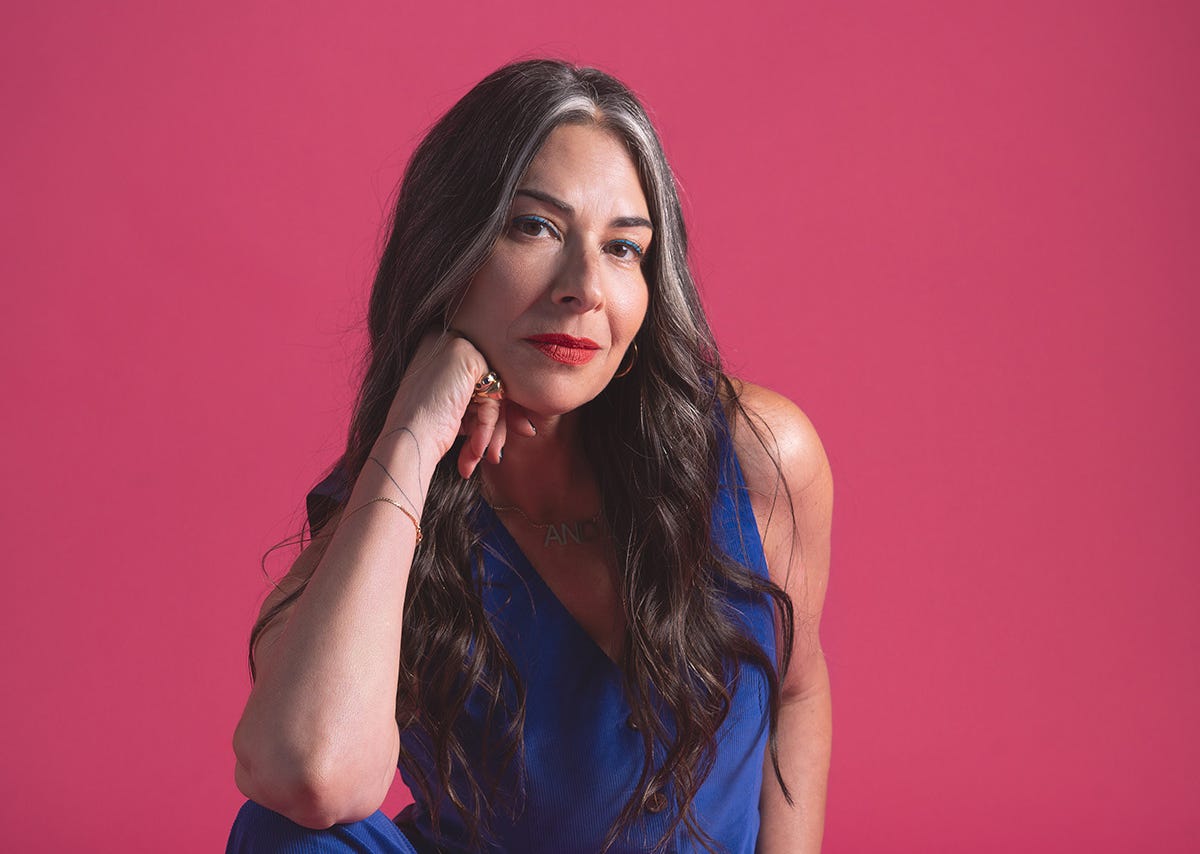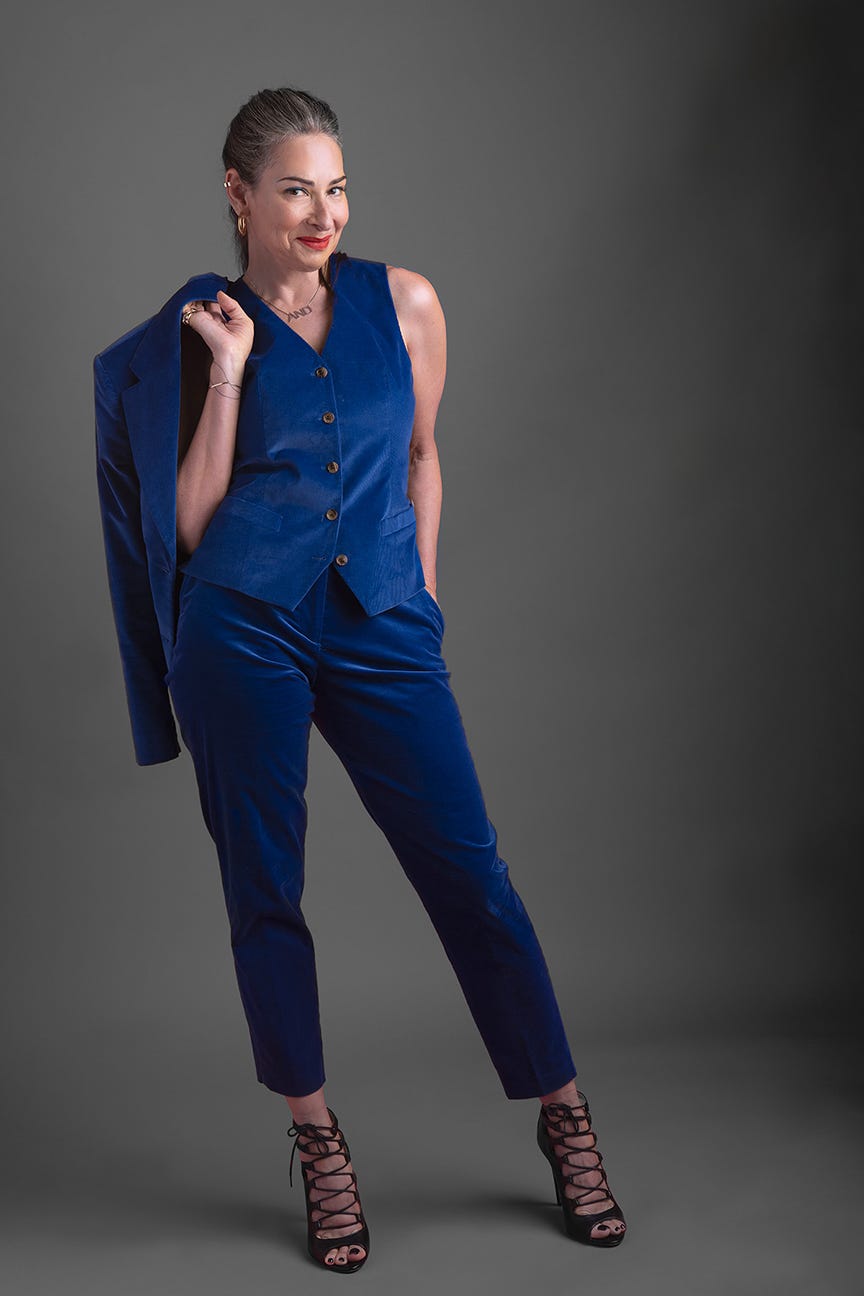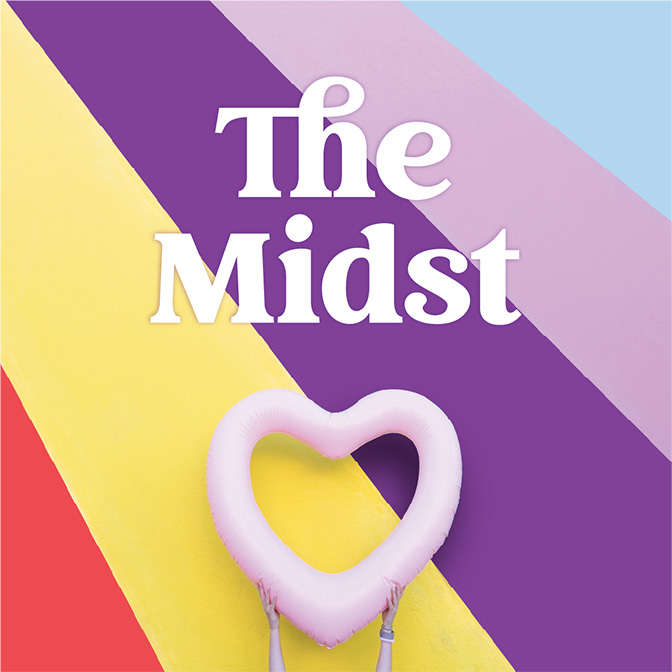Stacy London: The Maven of Midlife is revolutionizing menopause with style
From 'What Not to Wear' to wear whatever the f- you want, the stylist-turned–TV personality-turned-women’s health entrepreneur owns her evolution. (Part 1, updated January 2024)
By Gretchen Kalwinski • Photos by Chris Scalzi
This is part 1 of the Stacy London interview
Stacy London was an early-aughts household name with her TLC show What Not to Wear. In case you’re not makeover-obsessed, the show involved London and her co-host Clinton Kelly pouncing on unsuspecting makeover candidates who were nominated by their family and friends, reviewing their closets (usually in horror), then scurrying them off to NYC for a crash course in shopping and personal style.
Since the show wrapped in 2013, London has undergone a series of evolutions. She hosted another makeover show called Love, Lust or Run, lent her style pedigree to The Today Show and The View, grappled with the death of her father, underwent spinal-fusion surgery, and began her first serious relationship with a woman, comedian Cat Yezbak.
She also entered menopause, and was so disoriented by her lack of preparedness for that journey that she launched State Of Menopause, a health and wellness company that made products to address menopausal symptoms. In 2023, London sunset the company, because, although she retains a deep interest in the field, she wanted to move away from a product focus. As she put it on Instagram, “my interest lies in connecting us, in collaborating, in amplifying all the voices in this space. …Product has not held the same interest for me personally. I love being brand-agnostic!”
In short, London has earned her throne as the Maven of Midlife. She continues to be in the trenches working as a reigning leader of menopause advocacy and is an advisor to women’s health- and peri/menopause-focused companies Wile, Evernow, and Flow Health. She notes that the wind-down of State Of Menopause is in the service of a “much bigger idea that I’m really excited about launching...this is not an ending. Well, it is an ending … It’s like menopause. It’s an evolution…a transformation. And it is the next thing that’s coming for me.”
In 2023, London headed up a retreat at a well-known spa with a team of menopause authorities (Dr. Jen Gunter, author of the The Menopause Manifesto); also doctors Somi Javaid, Julie Sarton, and Joy’El Ballard — who spoke on topics from physical, mental and sexual health to medical advocacy. To ensure that participants felt uber cared for, London sourced products from dozens of brands to appoint their rooms with everything a peri- or post-menopausal woman could want (i.e., journals, books, vibrators, cooling pajamas, luxury face wash, vaginal care and more). During event-prep, once London started getting an influx of questions about how to dress their changing bodies, she recognized a need to merge her style expertise into the wellness event. She ended up bringing in 15 designers for on-site trunk shows and conducted daily style clinics for the participants.
We Zoomed with London in January 2024 to talk about menopause as reinvention, being childfree, and how to own your personal style evolution with age.
The Midst: In the last few years, in addition to celebrities speaking openly about menopause, we’ve seen the launch of companies and sites like Hey Perry and Evernow, and this under-recognized segment of healthcare is beginning to grow and be disrupted. Why do you think menopause is becoming less taboo and more openly talked about?
Stacy London: Because Gen X is basically running these menopause companies — that’s not by accident. Gen X has always pushed buttons and broken ceilings. We’re the generation where we got to menopause and were like, “We're not taking this lying down.” Forbes published a great article about that. There was nothing to help us; our doctors weren’t educated and weren’t even taught about menopause in medical school, or if they did, it was like a three-hour course.
If somebody tells us ‘no,’ we're gonna go and figure it out. That’s going to be our legacy: Putting the spotlight on women's health in a very different way, because we got to this stage of development with no real counseling about it, no understanding of what was happening to us, and we simply didn't accept that as an answer.
But that led me to the bigger issue, which is that the problems in women’s healthcare are [due to] the lack of research about female physiology. However, you express and feel your gender — or sexuality — that’s not what I'm talking about: I'm just talking physiologically. We don't know enough about female physiology because everything before 1993 was tested on men. Women weren't even required to be in [scientific] testing, so you had things like the Ambien debacle — where we were giving women the same amount of Ambien as men, which led to sleep-driving and eating, blacking out, all sorts of things. That happened because we simply are not made the same way. It’s not just menopause; it’s everything in female physiology, which could be exceedingly different from what we understand it to be because we don't yet have enough knowledge to understand why having a uterus and ovaries, and being able to give birth, make our hormone profile so different and our needs so incredibly different.
That was a big eye-opener. I started this journey because I was like, ‘I’m miserable; I cannot be the only one. Why is nobody talking about this?’ It feels like a free fall.
My company State of Menopause existed so menopause could become a more popular topic. I’d like to think it was one of the tailwinds of getting menopause to a place where people are talking about it as a natural transition and not some kind of curse.
These days, we're hearing people talk every day about perimenopause or menopause but this was not the topic du jour when I started talking about it. Somebody told me I was committing career [suicide]. But now even celebrities like Halle Berry has rē•spin [a product-focused website that “reframes menopause as hormone deficiency”] and Naomi Watts [the Founder of Stripes, a brand focused on hydration in menopause.] So, it’s been getting more and more normalized every day.
Even so, this is not an easy community to reach. We need education, assistance, and support. Most people don’t know anything about menopause or don’t understand what they’re experiencing is menopause. And there is deep shame about it because of its association with aging.
Menopause is not aging. You can get menopause at very different times of your life. But it is certainly associated with aging. So when you really go down this path, what you find is that there are people my age all asking the same question and demanding answers. You don’t see Gen X saying, “Put me out to pasture, I’m done.” We’re re-framing menopause as a natural transition that has a great deal of opportunity built into it.
I’m a proud member of Gen X, so I appreciate that. You’ve spoken about your difficulty getting a diagnosis, and being unprepared for menopause. How long did you experience the peri or menopausal symptoms before you got any answers?
I never got a diagnosis when I was in peri. Eventually, I asked my doctor and she said, “It’s menopause, you’ll get through it.” She was so nonchalant that I thought I was overreacting, so I didn’t ask any more questions. I asked my therapist — when I was forgetting my speech, kept losing my words mid-sentence, and thought I had early Alzheimer’s — and she was like, “Maybe it’s just menopause.” But nobody explained to me that brain fog, night sweats, hot flashes, vaginal dryness, painful sex, weight gain, skin rashes, allergies — all these things were related. When everything starts to go haywire in your body, and you have no idea what’s happening, you do mental gymnastics to try to figure out what it is.
"Nobody explained to me that brain fog, night sweats, hot flashes, vaginal dryness, painful sex, weight gain, skin rashes, allergies — all these things were related. When everything starts to go haywire in your body, and you have no idea what’s happening, you do mental gymnastics to try to figure out what it is.”
— Stacy London
Years later, when my father passed away, I thought, “That’s the physical manifestation of grief;” he had heart disease, I had heart palpitations. He had skin rashes, I had skin rashes. He couldn’t eat very much food without vomiting and I started to not be able to eat foods that I’d eaten my whole life — food allergies out of nowhere!
I had no idea that, yes, stressful events like spine surgery and losing a parent will amplify perimenopause. But it wasn’t clear to me that what I was experiencing was all part of the same thing because, unfortunately, the three or four most common symptoms surrounding the menopause experience aren’t logically related to each other. So any one symptom can easily be dismissed as nothing — or as something else. We need a roadmap in order to understand where we are in our hormonal health journey. Then, we need to figure out whether you’re in peri-, what happens after post-, and the ways you can take care of yourself that are going to contribute to your lifespan.
I want to circle back to shame, because shame is such a big part of menopause. I remember my aunts whispering about hot flashes and feeling really “eww” about it. Now I know that my response was my own internalized sexism. But I think the current crop of femtech companies are leading the way to eradicating that shame. They’re bringing this out in the open and insisting this is a conversation we need to be having.
Not to brag about our generation but I will. I think we are the last generation to experience that kind of internalized shame. From not talking about it and not knowing about it, we're also going to be the first generation to break the stigma and to really change the way this conversation is held — the way it is respected. I do not believe that you can put a lid back on Pandora’s box. This is a really good thing, not being able to unsee what you’ve seen, not being able to un-hear what you’ve heard. Once you have knowledge, you have agency, and once you have agency, you can start to manage this natural transition in a way that works for you, instead of having to fight and hide or pretend nothing is happening or white-knuckle through it. I think the adage is true: knowledge is power, especially when we’re talking about female physiology.
What was so sad to me about my experience with menopause was how isolated I felt. If I had known that 1 billion women were going to be in menopause by 2025 and that 1.3 million women enter menopause annually, I wouldn’t have felt so bad. The more we talk about it, the less scary and shameful it is.
Speaking of not studying women’s physiology enough, there’s that thing about how they only test seat belts using crash test dummies with male physiology, not female. So it’s like, great, we’re being ignored once again.
This is the first time I’ve seen such an important industry be so rocked. What’s happening in femtech right now, and anything related to women’s health, is huge. It’s not just menopause: It’s that we’re diagnosed four to six years later than men for hundreds of diseases. It’s [also] that our pain is dismissed and ignored. That’s always been the case because our pain may not be your average doctor’s version of pain. They may not know what that pain means, they may have no empathy for what that feels like.
This is truly starting to change; we’re seeing companies doing clinical research and innovating for stages that are still shrouded in stigma and mystery that should be out in the open.
You mentioned bodily autonomy, so I’ve got to talk about the overturning of Roe v. Wade. What was it like to be a leader in women’s health activism at a time when our bodily autonomy is literally under attack?
It makes me fight that much harder for *all* bodily autonomy. This is the thing that makes me crazy, we think this is just about abortion; this is NOT just about abortion. This is where it starts. And this kind of policing of our bodies has really in one form or another been true for a very long time; we just had Roe on our side before.
If you look at the medical community, we have been treated without bodily autonomy for so long. The more you go down that rabbit hole, there is racism, ableism, and ageism. The more marginalized the group on this marginalized and stigmatized topic, the more you see how awful the medical community has treated their bodies. It’s terrifying. When we get down to the most marginalized of the most marginalized in any area of female physiology, if we’re serving that group, then we serve everybody. We have to go to the most marginalized to get to the most generalized groups, not the other way around.
It’s encouraging to see women’s health in the news so much more before, and in fall 2023, the Biden administration announced a new White House initiative led by Dr. Jill Biden to boost how the government approaches research into women’s health. But I also remember when Trump was elected people called it, “the death rattle of the patriarchy,” and to me, the patriarchy still feels pretty robust.
I thought that too, and I think it’s going to take a lot longer than I had hoped. But I do also believe, especially in this area, especially in female medical health right now, there’s so much going on that is about re-looking at established industries — let’s say obstetrics — and the way women go into labor for hours and the best we can do for them is a C-section; like really? There’s nothing else we can do to possibly help in labor, or help the body after labor?
I honestly think the greatest thing that could happen is for men to be able to [bear] children and look, trans men can have children, and hopefully trans women will be able to have children soon; they’re talking about uterine implants now. It’d level the playing field if everyone could carry a child. I think laws would change very quickly if that was the case. That may sound radical but I hope it doesn’t. Women have been held back by unfair wages and the majority burden of childcare and that has bled over even to women who are child free.
With menopause, there’s this sense that, 1) you’re past your expiration date and no longer matter, even that is so heteronormative in its thinking, and 2) how many women do you know between the ages of 40 and 60 who never wanted children, or tried to have children and couldn’t, wound up childfree and still made incredible contributions to society? The idea that [having children] is a litmus test or measuring stick….it’s ridiculous to reduce any human to their reproductive health.
We’re not dying at 60; we’re dying in our 90s. We’re in our prime, so can we stop saying at 50, “I’m done?” You’re halfway through the book and that’s when it gets really good; that’s where all the plot twists and crazy characters are. This is an amazing time of life with a lot of life experience already banked. If you’re 50, you’ve already lived an amazing amount of experience. What do you do with that many more days in front of you? You’ve got maybe 40 years; what are you going to do?
“We’re not dying at 60; we’re dying in our 90s. We’re in our prime, so can we stop saying at 50, “I’m done?” You’re halfway through the book and that’s when it gets really good; that’s where all the plot twists and crazy characters are. This is an amazing time of life with a lot of life experience already banked. If you’re 50, you’ve already lived an amazing amount of experience. What do you do with that many more days in front of you? You’ve got maybe 40 years; what are you going to do?”
— Stacy London
Menopause is just about shifting gears. It’s a transition; going from one iteration to another. The idea we’re going to stay static in any way — whether that means not having our period, getting your period, or being able to be pregnant or not being able to be pregnant, or going through menopause, these are all things that are interrelated and if you really knew about them, maybe you wouldn’t look at them as such definitive sentences. It’s one run-on sentence!
Women have no expiration date. Sure, maybe you can no longer biologically have children, but otherwise it's only the values we held dear in our youth that expire, not us. We have to let go of those and come up with a new set of values that allows us to flourish during this time rather than kind of mourn the life we used to have.
That doesn't mean that there won't be a grieving period. There are lots of moments where it's like, ‘Well, I can't ride 50 miles on a bike anymore, but am I going to focus on the things I can't do or on the value of the things that I can?’ For example, losing my father made me value the time I have and deepen my interactions. Do we need to have a midlife crisis, or can we be prepared for this midlife shift in a new way, so that when we see it coming, we get excited instead of thinking, ‘This is the end of life as we know it. This is the end of youth.’
The third piece of this is sexual wellness which, in a way, is already a bigger industry than menopause. There are all kinds of menopause specialists, gynecologists, urologists — all sorts of people are now talking about why sex after menopause can be great…how to deal with painful sex, vaginal dryness, libido. There are so many more options than there ever were. I think that has become a branch of menopause that is no longer just related to menopause, and is an industry. I think you're gonna see a lot more around that for women as they hit midlife.
And, it's not simply physiological. There’s that thing where if you've been married for 25 years, you wake up one day and your kids are gone, and you look at each other and are like, ‘Do I even like you?’ There's a lot of reassessment that needs to happen at this moment in our lives. It’s an opportunity for invention. I believe Gen X is exposing midlife for what it could be; that we have so much more life and purpose left in us. Which is a much more empowering thing than the way we’ve always looked at midlife as a “reckoning of aging.”
Don’t miss part 2 of the interview here: What’s next for Stacy London: More women's wellness events? A new style show?
Studio photos by Chris Scalzi, copyright The Midst
Gretchen Kalwinski is a former magazine editor turned copy director for a healthcare company. A mother of dogs, she’s on a health journey managing chronic illness, and attempting to master gluten-free baking, Asian broths, and her self-care toolkit. Recent work can be found in Chicago: Rust Belt Anthology and she’s
on Substack, Twitter, and Instagram.













This was a dream interview to conduct; London is endlessly inspiring in her transformations!